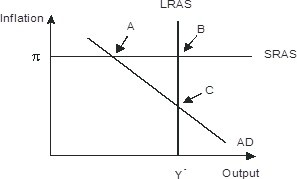Whenever there is a difference in the same exchange rate offered in two markets, an arbitrageur would:
a. wait for the markets to come to equilibrium.
b. buy in the market where the currency is offered at the cheaper rate,and simultaneously sell the currency where the rates are higher.
c. sell the cheaper-rate currency in the home market.
d. not consider the trade, since prices would undoubtedly change before it could be executed.
Ans: b. buy in the market where the currency is offered at the cheaper rate,and simultaneously sell the currency where the rates are higher.
You might also like to view...
Refer to the figure below.________ inflation will eventually move the economy pictured in the diagram from short-run equilibrium at point ________ to long-run equilibrium at point ________. 
A. Rising; A B. Falling; A; C C. Falling; B: C D. Rising; A; C
To encourage economic development a country should do all of the following EXCEPT
A) establish a system of property rights. B) allow creative destruction to run its course. C) limit the amount of imports allowed into the country. D) invest in human capital.
Using Scenario 2 suppose Bill has eliminated one of the answers but is unsure of which of the remaining four answers are correct. Determine whether it is rational for Bill to guess
What will be an ideal response?
Internal and external economies positively contributed to U.S. industrialization
Indicate whether the statement is true or false